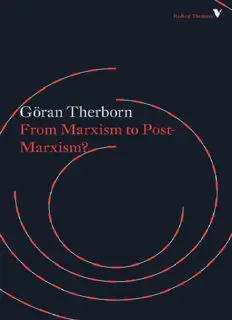
From Marxism to Post-Marxism? PDF
Preview From Marxism to Post-Marxism?
From Marxism to Post-Marxism? From Marxism to Post-Marxism? GÖRAN THERBORN This paperback edition published by Verso 2018 First published by Verso 2008 © Göran Therborn 2008, 2018 All rights reserved The moral rights of the author have been asserted 1 3 5 7 9 10 8 6 4 2 Verso UK: 6 Meard Street, London W1F 0EG US: 20 Jay Street, Suite 1010, Brooklyn, NY 11201 versobooks.com Verso is the imprint of New Left Books ISBN-13: 978-1-78873-243-7 ISBN-13: 978-1-78873-244-4(UK EBK) ISBN-13: 978-1-78873-245-1 (US EBK) British Library Cataloguing in Publication Data A catalogue record for this book is available from the British Library Library of Congress Cataloging-in- Publication Data A catalog record for this book is available from the Library of Congress Typeset by Hewer Text UK, Ltd, Edinburgh Printed and bound by CPI Group (UK) Ltd, Croydon, CR0 Y44 Contents INTRODUCTION: Our Time and the Age of Marx 1. Into the Twenty-first Century: The New Parameters of Global Politics 2. Twentieth-Century Marxism and the Dialectics of Modernity 3. After Dialectics: Radical Social Theory in the North at the Dawn of the Twenty-first Century Notes Index INTRODUCTION Our Time and the Age of Marx Karl Marx, born in 1818, is about the same age as Latin American independence. The first calls for independence were issued in 1810, although the decisive anticolonial battles of Mexico and Peru were fought in the 1820s. In Latin America, preparations for bicentenary celebrations in 2010 have already begun. Marx is of course younger than the protagonists of the Latin American liberation struggles – younger than, for instance, the Liberator himself, Simón Bolívar, recently revived as the spiritual guide of the revolution in Venezuela – for he was born in the dark years of European reaction, of the Holy Alliance of counter-revolution. But the seeds of modernity had been deeply planted in the economic and the cultural soil of Western Europe, and Karl witnessed their first flowering. The Communist Manifesto appeared – much ahead of its time, with its vision of globalized capitalism and working-class struggles – during ‘the Springtide of peoples’, the February–March revolutions of 1848. In terms of his literary counterparts, Marx is much younger than, say, Rumi, Dante, Cervantes or Shakespeare, and as a social and political theorist younger than, for instance, Hobbes and Locke – who in his day were the heroes of Cambridge academic politics – not to speak of classical sages such as Plato, Aristotle, Confucius and Mencius. Nowadays, it is much harder to determine how long an intellectual will last than to predict the likely lifespan of the average human being. What can we say of Marx’s ability to endure? As we approach the bicentennial of the man’s birth, is the body of work that bears his name (long?) dead, dying, ageing, or maturing? Is its resurrection possible? Certainly, it would be impossible to argue that the founder of historical materialism is timeless or eternally young. Any appropriate response would have to take into account the fact that Marx was a great articulator and a multidimensional personality. He was an intellectual, a social philosopher of the radical Enlightenment, a social scientistcum-historian, and a political strategist and leader – first of the diasporic Communist League and then of the International Working Men’s Association. Over the decades, these multiple personae have been assigned vastly different meanings and implications. Politics is inescapably a central piece of the legacy of Marxism, but nobody has ever claimed that Marx was a major political leader. He has served as a source of political inspiration and as a social compass for political navigation, but Marx the politician is long dead. Few, if any, social scientists and historians would deny that social and historical methodology, understanding and knowledge have progressed in the 125-odd years since Marx’s final illness put an end to his work on the manuscript of Capital. But here matters are more complicated, because social analysis, contemporary as well as historical, continues to draw upon ‘classics’, not only for inspiration but also for topics of research, concepts, interesting aperçus and intriguing insights. Emile Durkheim, Alexis de Tocqueville and Max Weber are coeval classics in this sense, as are Ibn Khaldoun and Machiavelli, although several centuries older. And great philosophers never die – they have their periods of hibernation as well as of flowering, which usually last a stretch of time somewhere between that of Kondratiev cycles and climatic epochs. This book is more concerned with Marx-ism than with Marx. But as far as Marx in our time is concerned, my impression is that he is maturing, a bit like a good cheese or a vintage wine – not suitable for dionysiac parties or quick gulps at the battlefront. Rather, he is a stimulating companion for profound thought about the meanings of modernity and of human emancipation. For his forthcoming bicentenary, I would propose three toasts. First, to Karl Marx as a proponent of emancipatory reason, of a rationalist scrutiny of the world, with a commitment to human freedom from exploitation and oppression. Second, to his historical materialist approach to social analysis – in other words, to his understanding of the present as history, with particular attention paid to the living and working conditions of ordinary people and to the economic and political materiality of power – an approach not to be followed as if laid out in a manual, but rather as a broad directive accompanied by the motivation to pursue it further. Third, Karl should be celebrated for his dialectical openness – his sensitivity to, and comprehension of, contradictions, antimonies and conflicts in social life. Marx-ism has, I think, an uncertain future, for reasons explained below. But
